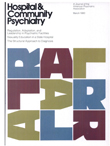A Correlation Between Dropout Status and Improvement in a Psychiatric Clinic
Abstract
Sixty psychiatric outpatients were independently evaluated before treatment in a mental health center and again after they had either completed five treatment visits or dropped out. Dropouts were older, more likely to be female, more severely ill, and more likely to expect medications. They improved less on scales of drug use, denial of illness, and grandiosity. Dropouts who did improve were more likely to have situational reactions. Better-educated patients bad better outcomes. Patients who were satisfied with the treatment they received were the most likely to have improved.
Access content
To read the fulltext, please use one of the options below to sign in or purchase access.- Personal login
- Institutional Login
- Sign in via OpenAthens
- Register for access
-
Please login/register if you wish to pair your device and check access availability.
Not a subscriber?
PsychiatryOnline subscription options offer access to the DSM-5 library, books, journals, CME, and patient resources. This all-in-one virtual library provides psychiatrists and mental health professionals with key resources for diagnosis, treatment, research, and professional development.
Need more help? PsychiatryOnline Customer Service may be reached by emailing [email protected] or by calling 800-368-5777 (in the U.S.) or 703-907-7322 (outside the U.S.).



